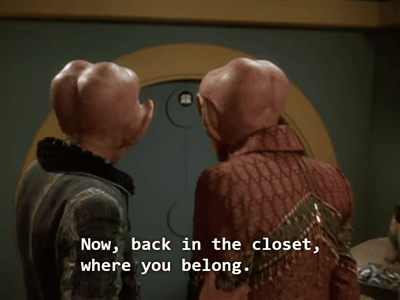Quark, Ferengi Culture, and the role of queer men in the oppression of women

Quark is a well-loved character from Star Trek: Deep Space Nine, and a common subject for episodes surrounding Ferengi Culture. A well-dressed, sleazy businessman with a well-hidden heart of gold, he lives to uphold the moral standard that Ferengi culture presents him with.
That moral standard is manifold, but most importantly relies on the oppression of female Ferengi, who aren’t allowed to wear clothes, go outside, and, most damningly, do business.
This excludes them from what is the other moral pillar of Ferengi culture: Profit Is Everything. Your entire life as a (male) Ferengi should be spent working as hard as you can to make as much money as you can, so that at the end of your life you may buy yourself and your family a place in heaven.
Quark is a prime example of this. He owns a bar, several gambling tables, and holosuites, which he rents out at exorbitant prices. He is the only Ferengi in his family who is able to make money, as his mother legally and morally cannot (though she does), and his brother Rom is a failed Ferengi, having been cheated out of all of his money by his ex wife and father-in-law. Quark is the only person in his family who can and does follow Ferengi law. And he is, by all standards, a very decent businessman, although occasionally a bit of a goody-two-shoes and far more customer-oriented than most of his kind.
Yet this makes him close-minded. Rom, a failed Ferengi who hasn’t got the lobes for business, greatly respects his mother, even after finding out she is earning money and therefore going against everything they believed in and everything they were taught. Quark, while loving his mother deeply, cannot bring himself to allow his mother to continue to do business, despite how good she is at it.
And herein lies the issue. Because for all intents and purposes, Quark is a queer Ferengi. His entire episode with Pel is romantically charged, even before she reveals to him that she is a woman. His relationship with Odo is not universally understood as being queer, although opinions are less divided among actually queer audiences. He even dresses well, is sassy and a general source of good (and bad) advice, and represents a similar niche in the series that is commonly attributed to “the queer friend” in media. (This niche he shares with Garak, the Cardassian tailor, though that is a different story. Garak fulfills this as one of his many roles, whereas Quark more fully embodies the archetype.)
And even if you wish to understand all of this as not inherently queer, he is queer from a social standpoint. He does not fit the societal mold and is a social outcast - through no fault of his own, but rather things he has no control over - and is not capable of changing, and is continuously persecuted for it. It only aligns with oppression the way queer people face it; there is nothing in general interactions between him and other Ferengi that suggests they hate him, but once they are “in the know”, his social difference becomes an excuse to persecute, mock, bully, publicly expose, and financially ruin him.
(By contrast, Rom’s oppression becomes that of an intellectually disabled person; perhaps not immediately visible when you look at him, but he is constantly demeaned and underestimated because of it, leading people to assume something must be off about him, and, when speaking about him to any other Ferengi, they will quickly let you know what exactly is wrong with him. The exact reason why their poor treatment of him is warranted and justified.)
So Quark is a queer man in an inherently sexist society, and his lowered social standing doesn’t once open him up to considering the plight of people whose social standard is also lowered. He is preoccupied with getting his own social standard back up to what it is “supposed to be” as a Ferengi man, that he never stops to think about Ferengi women, even when directly inspired to by his own mother.
In fact, he uses the oppression of women to further prop his own standing up. When his mother is revealed to be an activist, wearing clothes, doing business, earning money, he tries forcing her to stop so that he may go back to fitting social norms and in fact tries to get her to accept her oppression so that he may get into the good graces of the male demographic that oppresses them both.
Liberation for Quark, and very frequently liberation for queer men, hinges on the patriarchy accepting them as soon as possible, which is something they feel they can achieve by participating in the oppression of others so that they may in that way relate to their oppressors. Most commonly, most accessibly, women are their victims. They are everywhere and therefore an easy target for signalling to other men, Ferengi or not, that they are one of the guys. That they belong with the group.
It doesn’t work. It didn’t work for Quark, who became happier when he realised that he had a safety net on Deep Space Nine in the form of his friends on Bajor and in Starfleet, especially once he’d been financially ruined and cleaned out entirely by Brunt, after which the entire station banded together to save him from his fate. It doesn’t work for queer men either, as the patriarchy will hate them for their queerness, despite the fact that they are men.
Previous post Next post